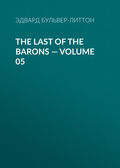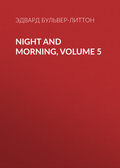
Эдвард Бульвер-Литтон
A Strange Story — Complete
CHAPTER XXVII
When Margrave had gone, I glanced at the clock,—not yet nine. I resolved to go at once to Mrs. Poyntz. It was not an evening on which she received, but doubtless she would see me. She owed me an explanation. How thus carelessly divulge a secret she had been enjoined to keep; and this rival, of whom I was ignorant? It was no longer a matter of wonder that Margrave should have described Lilian’s peculiar idiosyncrasies in his sketch of his fabulous Pythoness. Doubtless Mrs. Poyntz had, with unpardonable levity of indiscretion, revealed all of which she disapproved in my choice. But for what object? Was this her boasted friendship for me? Was it consistent with the regard she professed for Mrs. Ashleigh and Lilian? Occupied by these perplexed and indignant thoughts, I arrived at Mrs. Poyntz’s house, and was admitted to her presence. She was fortunately alone; her daughter and the colonel had gone to some party on the Hill. I would not take the hand she held out to me on entrance; seated myself in stern displeasure, and proceeded at once to inquire if she had really betrayed to Mr. Margrave the secret of my engagement to Lilian.
“Yes, Allen Fenwick; I have this day told, not only Mr. Margrave, but every person I met who is likely to tell it to some one else, the secret of your engagement to Lilian Ashleigh. I never promised to conceal it; on the contrary, I wrote word to Anne Ashleigh that I would therein act as my own judgment counselled me. I think my words to you were that ‘public gossip was sometimes the best security for the completion of private engagements.’”
“Do you mean that Mrs. or Miss Ashleigh recoils from the engagement with me, and that I should meanly compel them both to fulfil it by calling in the public to censure them—if—if—Oh, madam, this is worldly artifice indeed!”
“Be good enough to listen to me quietly. I have never yet showed you the letter to Mrs. Ashleigh, written by Lady Haughton, and delivered by Mr. Vigors. That letter I will now show to you; but before doing so I must enter into a preliminary explanation. Lady Haughton is one of those women who love power, and cannot obtain it except through wealth and station,—by her own intellect never obtain it. When her husband died she was reduced from an income of twelve thousand a year to a jointure of twelve hundred, but with the exclusive guardianship of a young son, a minor, and adequate allowances for the charge; she continued, therefore, to preside as mistress over the establishments in town and country; still had the administration of her son’s wealth and rank. She stinted his education, in order to maintain her ascendancy over him. He became a brainless prodigal, spendthrift alike of health and fortune. Alarmed, she saw that, probably, he would die young and a beggar; his only hope of reform was in marriage. She reluctantly resolved to marry him to a penniless, well-born, soft-minded young lady whom she knew she could control; just before this marriage was to take place he was killed by a fall from his horse. The Haughton estate passed to his cousin, the luckiest young man alive,—the same Ashleigh Sumner who had already succeeded, in default of male issue, to poor Gilbert Ashleigh’s landed possessions. Over this young man Lady Haughton could expect no influence. She would be a stranger in his house. But she had a niece! Mr. Vigors assured her the niece was beautiful. And if the niece could become Mrs. Ashleigh Sumner, then Lady Haughton would be a less unimportant Nobody in the world, because she would still have her nearest relation in a Somebody at Haughton Park. Mr. Vigors has his own pompous reasons for approving an alliance which he might help to accomplish. The first step towards that alliance was obviously to bring into reciprocal attraction the natural charms of the young lady and the acquired merits of the young gentleman. Mr. Vigors could easily induce his ward to pay a visit to Lady Haughton, and Lady Haughton had only to extend her invitations to her niece; hence the letter to Mrs. Ashleigh, of which Mr. Vigors was the bearer, and hence my advice to you, of which you can now understand the motive. Since you thought Lilian Ashleigh the only woman you could love, and since I thought there were other women in the world who might do as well for Ashleigh Sumner, it seemed to me fair for all parties that Lilian should not go to Lady Haughton’s in ignorance of the sentiments with which she had inspired you. A girl can seldom be sure that she loves until she is sure that she is loved. And now,” added Mrs. Poyntz, rising and walking across the room to her bureau,—“now I will show you Lady Haughton’s invitation to Mrs. Ashleigh. Here it is!”
I ran my eye over the letter, which she thrust into my hand, resuming her knitting-work while I read.
The letter was short, couched in conventional terms of hollow affection. The writer blamed herself for having so long neglected her brother’s widow and child; her heart had been wrapped up too much in the son she had lost; that loss had made her turn to the ties of blood still left to her; she had heard much of Lilian from their common friend, Mr. Vigors; she longed to embrace so charming a niece. Then followed the invitation and the postscript. The postscript ran thus, so far as I can remember:—
“Whatever my own grief at my irreparable bereavement, I am no egotist; I keep my sorrow to myself. You will find some pleasant guests at my house, among others our joint connection, young Ashleigh Sumner.”
“Woman’s postscripts are proverbial for their significance,” said Mrs. Poyntz, when I had concluded the letter and laid it on the table; “and if I did not at once show you this hypocritical effusion, it was simply because at the name Ashleigh Sumner its object became transparent, not perhaps to poor Anne Ashleigh nor to innocent Lilian, but to my knowledge of the parties concerned, as it ought to be to that shrewd intelligence which you derive partly from nature, partly from the insight into life which a true physician cannot fail to acquire. And if I know anything of you, you would have romantically said, had you seen the letter at first, and understood its covert intention, ‘Let me not shackle the choice of the woman I love, and to whom an alliance so coveted in the eyes of the world might, if she were left free, be proffered.’”
“I should not have gathered from the postscript all that you see in it; but had its purport been so suggested to me, you are right, I should have so said. Well, and as Mr. Margrave tells me that you informed him that I have a rival, I am now to conclude that the rival is Mr. Ashleigh Sumner?”
“Has not Mrs. Ashleigh or Lilian mentioned him in writing to you?”
“Yes, both; Lilian very slightly, Mrs. Ashleigh with some praise, as a young man of high character, and very courteous to her.”
“Yet, though I asked you to come and tell me who were the guests at Lady Haughton’s, you never did so.”
“Pardon me; but of the guests I thought nothing, and letters addressed to my heart seemed to me too sacred to talk about. And Ashleigh Sumner then courts Lilian! How do you know?”
“I know everything that concerns me; and here, the explanation is simple. My aunt, Lady Delafield, is staying with Lady Haughton. Lady Delafield is one of the women of fashion who shine by their own light; Lady Haughton shines by borrowed light, and borrows every ray she can find.”
“And Lady Delafield writes you word—”
“That Ashleigh Sumner is caught by Lilian’s beauty.”
“And Lilian herself—”
“Women like Lady Delafield do not readily believe that any girl could refuse Ashleigh Sumner; considered in himself, he is steady and good-looking; considered as owner of Kirby Hall and Haughton Park, he has, in the eyes of any sensible mother, the virtues of Cato and the beauty of Antinous.”
I pressed my hand to my heart; close to my heart lay a letter from Lilian, and there was no word in that letter which showed that her heart was gone from mine. I shook my head gently, and smiled in confiding triumph.
Mrs. Poyntz surveyed me with a bent brow and a compressed lip.
“I understand your smile,” she said ironically. “Very likely Lilian may be quite untouched by this young man’s admiration, but Anne Ashleigh may be dazzled by so brilliant a prospect for her daughter; and, in short, I thought it desirable to let your engagement be publicly known throughout the town to-day. That information will travel; it will reach Ashleigh Sumner through Mr. Vigors, or others in this neighbourhood, with whom I know that he corresponds. It will bring affairs to a crisis, and before it may be too late. I think it well that Ashleigh Sumner should leave that house; if he leave it for good, so much the better. And, perhaps, the sooner Lilian returns to L—— the lighter your own heart will be.”
“And for these reasons you have published the secret of—”
“Your engagement? Yes. Prepare to be congratulated wherever you go. And now if you hear either from mother or daughter that Ashleigh Sumner has proposed, and been, let us say, refused, I do not doubt that, in the pride of your heart, you will come and tell me.”
“Rely upon it, I will; but before I take leave, allow me to ask why you described to a young man like Mr. Margrave—, whose wild and strange humours you have witnessed and not approved—any of those traits of character in Miss Ashleigh which distinguish her from other girls of her age?”
“I? You mistake. I said nothing to him of her character. I mentioned her name, and said she was beautiful, that was all.”
“Nay, you said that she was fond of musing, of solitude; that in her fancies she believed in the reality of visions which might flit before her eyes as they flit before the eyes of all imaginative dreamers.”
“Not a word did I say to Mr. Margrave of such peculiarities in Lilian; not a word more than what I have told you, on my honour!”
Still incredulous, but disguising my incredulity with that convenient smile by which we accomplish so much of the polite dissimulation indispensable to the decencies of civilized life, I took my departure, returned home, and wrote to Lilian.
CHAPTER XXVIII
The conversation with Mrs. Poyntz left my mind restless and disquieted. I had no doubt, indeed, of Lilian’s truth; but could I be sure that the attentions of a young man, with advantages of fortune so brilliant, would not force on her thoughts the contrast of the humbler lot and the duller walk of life in which she had accepted as companion a man removed from her romantic youth less by disparity of years than by gravity of pursuits? And would my suit now be as welcomed as it had been by a mother even so unworldly as Mrs. Ashleigh? Why, too, should both mother and daughter have left me so unprepared to hear that I had a rival; why not have implied some consoling assurance that such rivalry need not cause me alarm? Lilian’s letters, it is true, touched but little on any of the persons round her; they were filled with the outpourings of an ingenuous heart, coloured by the glow of a golden fancy. They were written as if in the wide world we two stood apart alone, consecrated from the crowd by the love that, in linking us together, had hallowed each to the other. Mrs. Ashleigh’s letters were more general and diffusive,—detailed the habits of the household, sketched the guests, intimated her continued fear of Lady Haughton, but had said nothing more of Mr. Ashleigh Sumner than I had repeated to Mrs. Poyntz. However, in my letter to Lilian I related the intelligence that had reached me, and impatiently I awaited her reply.
Three days after the interview with Mrs. Poyntz, and two days before the long-anticipated event of the mayor’s ball, I was summoned to attend a nobleman who had lately been added to my list of patients, and whose residence was about twelve miles from L——. The nearest way was through Sir Philip Derval’s park. I went on horseback, and proposed to stop on the way to inquire after the steward, whom I had seen but once since his fit, and that was two days after it, when he called himself at my house to thank me for my attendance, and to declare that he was quite recovered.
As I rode somewhat fast through the park, I came, however, upon the steward, just in front of the house. I reined in my horse and accosted him. He looked very cheerful.
“Sir,” said he, in a whisper, “I have heard from Sir Philip; his letter is dated since—since-my good woman told you what I saw,—well, since then. So that it must have been all a delusion of mine, as you told her. And yet, well—well—we will not talk of it, doctor; but I hope you have kept the secret. Sir Philip would not like to hear of it, if he comes back.”
“Your secret is quite safe with me. But is Sir Philip likely to come back?”
“I hope so, doctor. His letter is dated Paris, and that’s nearer home than he has been for many years; and—but bless me! some one is coming out of the house,—a young gentleman! Who can it be?”
I looked, and to my surprise I saw Margrave descending the stately stairs that led from the front door. The steward turned towards him, and I mechanically followed, for I was curious to know what had brought Margrave to the house of the long-absent traveller.
It was easily explained. Mr. Margrave had heard at L—— much of the pictures and internal decorations of the mansion. He had, by dint of coaxing (he said, with his enchanting laugh), persuaded the old housekeeper to show him the rooms.
“It is against Sir Philip’s positive orders to show the house to any stranger, sir; and the housekeeper has done very wrong,” said the steward.
“Pray don’t scold her. I dare say Sir Philip would not have refused me a permission he might not give to every idle sightseer. Fellow-travellers have a freemasonry with each other; and I have been much in the same far countries as himself. I heard of him there, and could tell you more about him, I dare say, than you know yourself.”
“You, sir! pray do then.”
“The next time I come,” said Margrave, gayly; and, with a nod to me, he glided off through the trees of the neighbouring grove, along the winding footpath that led to the lodge.
“A very cool gentleman,” muttered the steward; “but what pleasant ways he has! You seem to know him, sir. Who is he, may I ask?”
“Mr. Margrave,—a visitor at L——, and he has been a great traveller, as he says; perhaps he met Sir Philip abroad.”
“I must go and hear what he said to Mrs. Gates; excuse me, sir, but I am so anxious about Sir Philip.”
“If it be not too great a favour, may I be allowed the same privilege granted to Mr. Margrave? To judge by the outside of the house, the inside must be worth seeing; still, if it be against Sir Philip’s positive orders—”
“His orders were, not to let the Court become a show-house,—to admit none without my consent; but I should be ungrateful indeed, doctor, if I refused that consent to you.”
I tied my horse to the rusty gate of the terrace-walk, and followed the steward up the broad stairs of the terrace. The great doors were unlocked. We entered a lofty hall with a domed ceiling; at the back of the hall the grand staircase ascended by a double flight. The design was undoubtedly Vanbrugh’s,—an architect who, beyond all others, sought the effect of grandeur less in space than in proportion; but Vanbrugh’s designs need the relief of costume and movement, and the forms of a more pompous generation, in the bravery of velvets and laces, glancing amid those gilded columns, or descending with stately tread those broad palatial stairs. His halls and chambers are so made for festival and throng, that they become like deserted theatres, inexpressibly desolate, as we miss the glitter of the lamps and the movement of the actors.
The housekeeper had now appeared,—a quiet, timid old woman. She excused herself for admitting Margrave—not very intelligibly. It was plain to see that she had, in truth, been unable to resist what the steward termed his “pleasant ways.”
As if to escape from a scolding, she talked volubly all the time, bustling nervously through the rooms, along which I followed her guidance with a hushed footstep. The principal apartments were on the ground-floor, or rather, a floor raised some ten or fifteen feet above the ground; they had not been modernized since the date in which they were built. Hangings of faded silk; tables of rare marble, and mouldered gilding; comfortless chairs at drill against the walls; pictures, of which connoisseurs alone could estimate the value, darkened by dust or blistered by sun and damp, made a general character of discomfort. On not one room, on not one nook, still lingered some old smile of home.
Meanwhile, I gathered from the housekeeper’s rambling answers to questions put to her by the steward, as I moved on, glancing at the pictures, that Margrave’s visit that day was not his first. He had been to the house twice before,—his ostensible excuse that he was an amateur in pictures (though, as I had before observed, for that department of art he had no taste); but each time he had talked much of Sir Philip. He said that though not personally known to him, he had resided in the same towns abroad, and had friends equally intimate with Sir Philip; but when the steward inquired if the visitor had given any information as to the absentee, it became very clear that Margrave had been rather asking questions than volunteering intelligence.
We had now come to the end of the state apartments, the last of which was a library. “And,” said the old woman, “I don’t wonder the gentleman knew Sir Philip, for he seemed a scholar, and looked very hard over the books, especially those old ones by the fireplace, which Sir Philip, Heaven bless him, was always poring into.”
Mechanically I turned to the shelves by the fireplace, and examined the volumes ranged in that department. I found they contained the works of those writers whom we may class together under the title of mystics,—Iamblichus and Plotinus; Swedenborg and Behmen; Sandivogius, Van Helmont, Paracelsus, Cardan. Works, too, were there, by writers less renowned, on astrology, geomancy, chiromancy, etc. I began to understand among what class of authors Margrave had picked up the strange notions with which he was apt to interpolate the doctrines of practical philosophy.
“I suppose this library was Sir Philip’s usual sitting-room?” said I.
“No, sir; he seldom sat here. This was his study;” and the old woman opened a small door, masked by false book backs. I followed her into a room of moderate size, and evidently of much earlier date than the rest of the house. “It is the only room left of an older mansion,” said the steward in answer to my remark. “I have heard it was spared on account of the chimneypiece. But there is a Latin inscription which will tell you all about it. I don’t know Latin myself.”
The chimneypiece reached to the ceiling. The frieze of the lower part rested on rude stone caryatides; the upper part was formed of oak panels very curiously carved in the geometrical designs favoured by the taste prevalent in the reigns of Elizabeth and James, but different from any I had ever seen in the drawings of old houses,—and I was not quite unlearned in such matters, for my poor father was a passionate antiquary in all that relates to mediaeval art. The design in the oak panels was composed of triangles interlaced with varied ingenuity, and enclosed in circular bands inscribed with the signs of the Zodiac.
On the stone frieze supported by the caryatides, immediately under the woodwork, was inserted a metal plate, on which was written, in Latin, a few lines to the effect that “in this room, Simon Forman, the seeker of hidden truth, taking refuge from unjust persecution, made those discoveries in nature which he committed, for the benefit of a wiser age, to the charge of his protector and patron, the worshipful Sir Miles Derval, knight.”
Forman! The name was not quite unfamiliar to me; but it was not without an effort that my memory enabled me to assign it to one of the most notorious of those astrologers or soothsayers whom the superstition of an earlier age alternately persecuted and honoured.
The general character of the room was more cheerful than the statelier chambers I had hitherto passed through, for it had still the look of habitation,—the armchair by the fireplace; the kneehole writing-table beside it; the sofa near the recess of a large bay-window, with book-prop and candlestick screwed to its back; maps, coiled in their cylinders, ranged under the cornice; low strong safes, skirting two sides of the room, and apparently intended to hold papers and title-deeds, seals carefully affixed to their jealous locks. Placed on the top of these old-fashioned receptacles were articles familiar to modern use,—a fowling-piece here, fishing-rods there, two or three simple flower-vases, a pile of music books, a box of crayons. All in this room seemed to speak of residence and ownership,—of the idiosyncrasies of a lone single man, it is true, but of a man of one’s own time,—a country gentleman of plain habits but not uncultivated tastes.
I moved to the window; it opened by a sash upon a large balcony, from which a wooden stair wound to a little garden, not visible in front of the house, surrounded by a thick grove of evergreens, through which one broad vista was cut, and that vista was closed by a view of the mausoleum.
I stepped out into the garden,—a patch of sward with a fountain in the centre, and parterres, now more filled with weeds than flowers. At the left corner was a tall wooden summer-house or pavilion,—its door wide open. “Oh, that’s where Sir Philip used to study many a long summer’s night,” said the steward.
“What! in that damp pavilion?”
“It was a pretty place enough then, sir; but it is very old,—they say as old as the room you have just left.”
“Indeed, I must look at it, then.”
The walls of this summer-house had once been painted in the arabesques of the Renaissance period; but the figures were now scarcely traceable. The woodwork had started in some places, and the sunbeams stole through the chinks and played on the floor, which was formed from old tiles quaintly tessellated and in triangular patterns; similar to those I had observed in the chimneypiece. The room in the pavilion was large, furnished with old worm-eaten tables and settles. “It was not only here that Sir Philip studied, but sometimes in the room above,” said the steward.
“How do you get to the room above? Oh, I see; a stair case in the angle.” I ascended the stairs with some caution, for they were crooked and decayed; and, on entering the room above, comprehended at once why Sir Philip had favoured it.
The cornice of the ceiling rested on pilasters, within which the compartments were formed into open unglazed arches, surrounded by a railed balcony. Through these arches, on three sides of the room, the eye commanded a magnificent extent of prospect. On the fourth side the view was bounded by the mausoleum. In this room was a large telescope; and on stepping into the balcony, I saw that a winding stair mounted thence to a platform on the top of the pavilion,—perhaps once used as an observatory by Forman himself.
“The gentleman who was here to-day was very much pleased with this look-out, sir,” said the housekeeper. “Who would not be? I suppose Sir Philip has a taste for astronomy.”
“I dare say, sir,” said the steward, looking grave; “he likes most out-of-the-way things.”
The position of the sun now warned me that my time pressed, and that I should have to ride fast to reach my new patient at the hour appointed. I therefore hastened back to my horse, and spurred on, wondering whether, in the chain of association which so subtly links our pursuits in manhood to our impressions in childhood, it was the Latin inscription on the chimneypiece that had originally biassed Sir Philip Derval’s literary taste towards the mystic jargon of the books at which I had contemptuously glanced.







